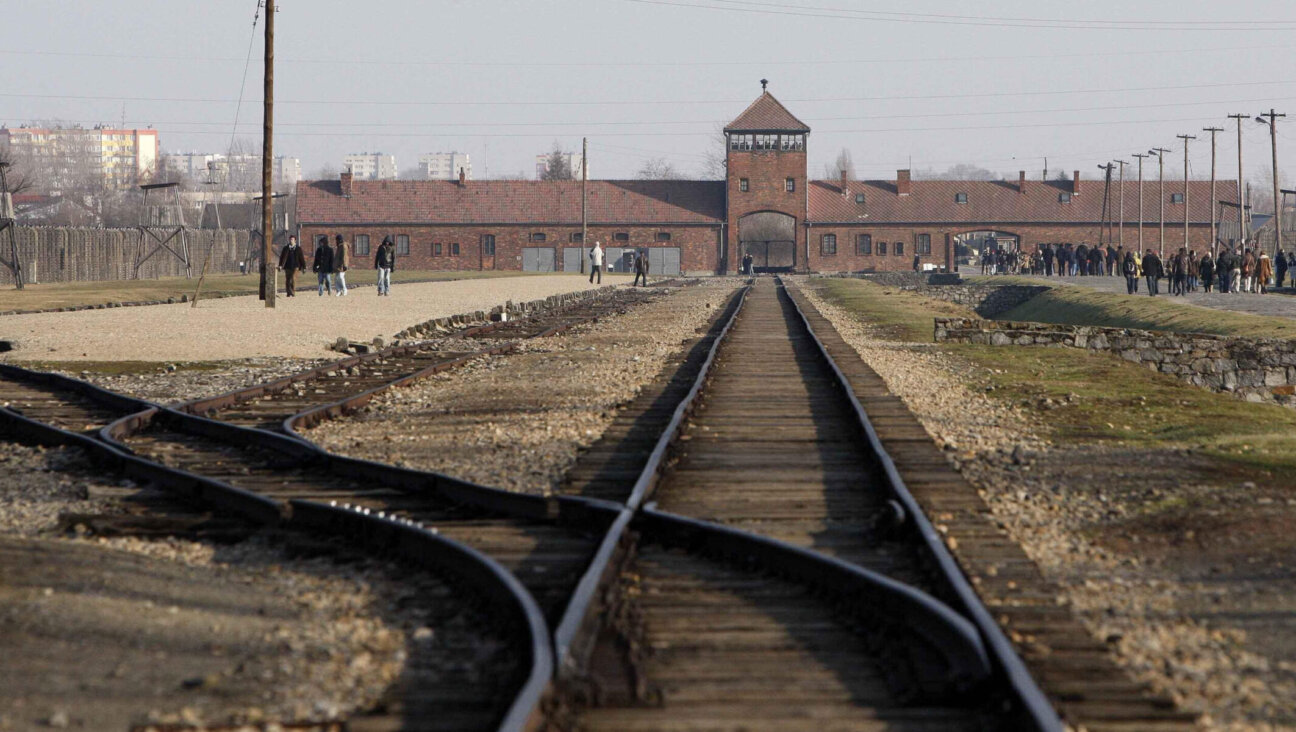Rightist Foils Bid to Open Books of Settlement Unit

?Brothers? Yair Lapid (left) and Naftali Bennett Image by Getty Images
Tzufim settlement outpost, western Samaria, October 2012 / Getty Images
The chairman of the Knesset’s law and legislation committee on Thursday postponed, for the second time in two weeks, a scheduled vote on a bill requiring transparency in government funding of West Bank settlements.
The bill has majority support in the committee, whose membership mirrors the overall Knesset party breakdown. The chairman, David Rotem of the Yisrael Beiteinu party, asked by opposition lawmaker Ahmed Tibi “what you’re trying to hide,” said — according to an official Knesset record — that he didn’t want to give settlement opponents “information that you can use to bring a Supreme Court lawsuit and prevent construction in Judea and Samaria.”
The postponement came three days after the Knesset’s finance committee approved an allocation of $51 million (177 million shekels) requested by the government for the private organization that conducts most settlement development, the Settlement Division of the World Zionist Organization.

?Brothers? Yair Lapid (left) and Naftali Bennett Image by Getty Images
The allocation passed with the support of three committee members from the center-left Yesh Atid party, part of the Netanyahu coalition, after they received a promise from coalition leaders that the transparency bill would be brought to a vote on Thursday. On Thursday, however, a committee member from the pro-settler Jewish Home party, Orit Struck, asked for a postponement for “consultation within her party.” Rotem promptly granted the request.
The transparency bill was submitted last year by Justice Minister Tzipi Livni. It would subject the WZO Settlement Division to Israel’s freedom of information law, which currently applies to government bodies. The WZO is a private nonprofit controlled by coalitions of Diaspora Jewish organizations and Israeli political parties. Its Settlement Division has been run for years as a semi-autonomous unit, funded entirely by the government but nominally owned by the WZO.
The arrangement allows the government a measure of deniability in settlement activity and frees the settlement body from the public scrutiny required of government bodies, including the freedom of information law.
The Diaspora organizations that share control of the WZO, including B’nai B’rith, the Reform and Conservative movements and others, have acquiesced in the arrangement out of a professed respect for Israeli democracy, and have been repeatedly assured that the Settlement Division operates under close government scrutiny.
The arrangement provoked a scandal in 2005 when a report commissioned by the Ariel Sharon government, under former deputy state prosecutor Talia Sasson, exposed extensive government and WZO collusion in the establishment of settlement outposts that were illegal under Israeli law. The Sasson Report (English summary here, full Hebrew report here) caused a furor in Israel and evoked mild expressions of alarm from the heads of the Diaspora organizations involved. The government voted to approve and implement but the matter dwindled in the face of bureaucratic resistance and was forgotten until Livni raised it again last year.
Livni’s transparency bill was originally scheduled for a vote on March 25. At that time Rotem convened the committee early when only one other member was present, a representative of the pro-settler Bayit Yehudi-Jewish Home party. With just two people in the room, the postponement passed unanimously. This brought furious protests from parties of the center and left, including Yair Lapid’s Yesh Atid and Livni’s Hatnuah. Both are part of the governing coalition but oppose settlements to varying degrees.
Committee member Eleazar Stern of Hatnuah, a retired IDF General Staff member and one of the first Orthodox Jews to reach the rank of major general, told Rotem during the debate that his behavior is “placing the division under suspicion of theft and dishonesty,” and “proves that improper things are going on there.”
Pro-settlement parties, Jewish Home, Likud and Yisrael Beiteinu (the latter two ran as a joint electoral bloc but retain separate party organizations) won 43 seats in the 120 in the last elections in January 2013. 59 seats are held by parties that believe Israel should make stronger efforts for peace and see the current Palestinian leadership as a viable partner. The remaining 18 represent two ultra-Orthodox parties that are neutral on settlements and Paletinian statehood. One of the two, Shas, with 11 Knesset seats, was staunchly right-wing under former leader Eli Yishai, but has moved sharply to the center-left on economic and territorial questions since party founder Arye Deri regained control in 2012.
Netanyahu was able to form a government in which pro-settlement groups hold a majority after Yesh Atid founder Yair Lapid formed a “covenant of brothers” with Jewish Home leader Naftali Bennett to push through certain domestic legislation, notably ending the blanket draft deferment for ultra-Orthodox yeshiva students.
In the end, Bennett’s Modern Orthodox party came under furious pressure from ultra-Orthodox rabbis and succeeded in watering down the draft bill that he and Lapid had agreed on. In the meantime, however, Lapid has come under steadily growing criticism from liberal supporters for crowning Netanyahu head of a government in which pro-settlement parties hold 43 of the 68 coalition seats.
A message from our Publisher & CEO Rachel Fishman Feddersen

I hope you appreciated this article. Before you go, I’d like to ask you to please support the Forward’s award-winning, nonprofit journalism so that we can be prepared for whatever news 2025 brings.
At a time when other newsrooms are closing or cutting back, the Forward has removed its paywall and invested additional resources to report on the ground from Israel and around the U.S. on the impact of the war, rising antisemitism and polarized discourse.
Readers like you make it all possible. Support our work by becoming a Forward Member and connect with our journalism and your community.
— Rachel Fishman Feddersen, Publisher and CEO





















